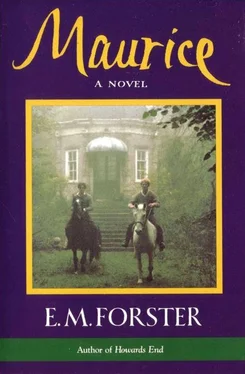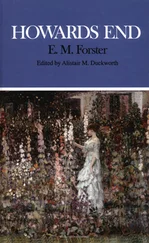A laugh answered. He had always liked his friend's laugh, and at such a moment the soft rumble of it reassured him; it suggested happiness and security. "That's right," he said, and went so far as to stretch his hand into a bush of laurels. "That's better than making me a long set speech, which convinces neither yourself nor me." His last words were "Next Wednesday, say at 7.45. Dinner-jacket's enough, as you know."
They were his last words, because Maurice had disappeared thereabouts, leaving no trace of his presence except a little pile of the petals of the evening primrose, which mourned from the ground like an expiring fire. To the end of his life Clive was not sure of the exact moment of departure, and with the approach of old age he grew uncertain whether the moment had yet occurred. The Blue Room would glimmer, ferns undulate. Out of some external Cambridge his friend began beckoning to him, clothed in the sun, and shaking out the scents and sounds of the May term.
But at the time he was merely offended at a discourtesy, and compared it with similar lapses in the past. He did not realize that this was the end, without twilight or compromise, that he should never cross Maurice's track again, nor speak to those who had seen him. He waited for a little in the alley, then returned to the house, to correct his proofs and to devise some method of concealing the truth from Anne.
I
In its original form, which it still almost retains, Maurice dates from 1913. It was the direct result of a visit to Edward Carpenter at Milthorpe. Carpenter had a prestige which cannot be understood today. He was a rebel appropriate to his age. He was sentimental and a little sacramental, for he had begun life as a clergyman. He was a socialist who ignored industrialism and a simple-lifer with an independent income and a Whitmannic poet whose nobility exceeded his strength and, finally, he was a believer in the Love of Comrades, whom he sometimes called Uranians. It was this last aspect of him that attracted me in my loneliness. For a short time he seemed to hold the key to every trouble. I approached him through Lowes Dickinson, and as one approaches a saviour.
It must have been on my second or third visit to the shrine that the spark was kindled and he and his comrade George Merrill combined to make a profound impression on me and to touch a creative spring. George Merrill also touched my backside — gently and just above the buttocks. I believe he touched most people's. The sensation was unusual and I still remember it, as I remember the position of a long vanished tooth. It was as much psychological as physical. It seemed to go straight through the small of my back into my ideas, without involving my thoughts. If it really did this, it would have acted in strict accordance with Carpenter's yogified mysticism, and would prove that at that precise moment I had conceived.
I then returned to Harrogate, where my mother was taking a cure, and immediately began to write Maurice. No other of my books has started off in this way. The general plan, the three characters, the happy ending for two of them, all rushed into my pen. And the whole thing went through without a hitch. It was finished in 1914. The friends, men and women, to whom I showed it liked it. But they were carefully picked. It has not so far had to face the critics or the public, and I have myself been too much involved in it, and for too long, to judge.
A happy ending was imperative. I shouldn't have bothered to write otherwise! I was determined that in fiction anyway two men should fall in love and remain in it for the ever and ever that fiction allows, and in this sense Maurice and Alec still roam the greenwood. I dedicated it "To a Happier Year" and not altogether vainly. Happiness is its keynote — which by the way has had an unexpected result: it has made the book more difficult to publish. Unless the Wolfenden Report becomes law, it will probably have to remain in manuscript. If it ended unhappily, with a lad dangling from a noose or with a suicide pact, all would be well, for there is no pornography or seduction of minors. But the lovers get away unpunished and consequently recommend crime. Mr Borenius is too incompetent to catch them, and the only penalty society exacts is an exile they gladly embrace.
Notes on the three men
In Maurice I tried to create a character who was completely unlike myself or what I supposed myself to be: someone handsome, healthy, bodily attractive, mentally torpid, not a bad business man and rather a snob. Into this mixture I dropped an ingredient that puzzles him, wakes him up, torments him and finally saves him. His surroundings exasperate him by their very normality: mother, two sisters, a comfortable home, a respectable job gradually turn out to be Hell; he must either smash them or be smashed, there is no third course. The working out of such a character, the setting of traps for him which he sometimes eluded, sometimes fell into, and finally did smash, proved a welcome task.
If Maurice is Suburbia, Clive is Cambridge. Knowing the university, or one corner of it, pretty well, I produced him without difficulty and got some initial hints for him from a slight academic acquaintance. The calm, the superiority of outlook, the clarity and the intelligence, the assured moral standards, the blondness and delicacy that did not mean frailty, the blend of lawyer and squire, all lay in the direction of that acquaintance, though it was I who gave Clive his "hellenic" temperament and flung him into Maurice's affectionate arms. Once there, he took charge, he laid down the lines on which the unusual relationship should proceed. He believed in platonic restraint and induced Maurice to acquiesce, which does not seem to me at all unlikely. Maurice at this stage is humble and inexperienced and adoring, he is the soul released from prison, and if asked by his deliverer to remain chaste he obeys. Consequently the relationship lasts for three years — precarious, idealistic and peculiarly English: what Italian boy would have put up with it? — still it lasts until Clive ends it by turning to women and sending Maurice back to prison. Henceforward Clive deteriorates, and so perhaps does my treatment of him. He has annoyed me. I may nag at him over much, stress his aridity and political pretensions and the thinning of his hair, nothing he or his wife or his mother does is ever right. This works well enough for Maurice, for it accelerates his descent into Hell and toughens him there for the final reckless climb. But it may be unfair on Clive who intends no evil and who feels the last flick of my whip in the final chapter, when he discovers that his old Cambridge friend has relapsed inside Penge itself, and with a gamekeeper.
Alec starts as an emanation from Milthorpe, he is the touch on the backside. But he has no further connection with the methodical George Merrill and in many ways he is a premonition. As I worked at him, I got to know him better, partly through personal experiences, and some of them were useful. He became less of a comrade and more of a person, he became livelier and heavier and demanded more room, and the additions to the novel (there were scarcely any cancellations in it) are all due to him. Not much can be premised about him. He is senior in date to the prickly gamekeepers of D. H. Lawrence, and had not the advantage of their disquisitions, nor, though he might have met my own Stephen Wonham, would they have had more in common than a mug of beer. What was his life before Maurice arrived? Clive's earlier life is easily recalled, but Alec's, when I tried to evoke it, turned into a survey and had to be scrapped. He certainly objected to nothing — one knows that much. No more, once they met, did Maurice, and Lytton Strachey, an early reader, thought this would prove their undoing. He wrote me a delightful and disquieting letter and said that the relationship of the two rested upon curiosity and lust and would only last six weeks. Shades of Edward Carpenter! — whose name Lytton always greeted with a series of little squeaks. Carpenter believed that Uranians remained loyal to each other for ever. And in my experience though loyalty cannot be counted on it can always be hoped for and be worked towards and may flourish in the most unlikely soil. Both the suburban youth and the countrified one are capable of loyalty. Risley, the clever Trinity undergraduate, wasn't, and Risley, as Lytton gleefully detected, was based upon Lytton.
Читать дальше












